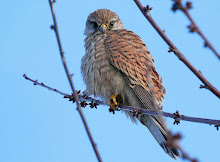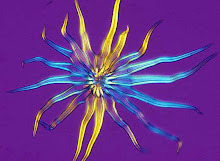


Downstream from the picturesque medieval village of Blanchland - see http://www.blanchland.org/ - Northumberland's River Derwent races over three kilometres of stony riverbed before it empties into the managed confines of the Derwent Reservoir. It’s perfect dipper habitat and today we mapped the territories of two pairs along this wild stretch of river. Mapping dipper territory is relatively easy – just follow them along the river until they do a U-turn and race back past you; they won’t cross into another’s stretch of river once ownership has been established. We never got close enough for a really good photograph, but close enough to record one of this bird’s remarkable features: white eyelids. When a dipper blinks its eyes go bright white. We also encountered a pair of goosander that are probably nesting along this stretch of the Derwent and just managed a shot of the handsomely-plumaged drake as it streaked past.























We were in Blanchland around 5pm today and managed a few pics of Dippers also.
ReplyDeleteGreat shot of the speeding goosander - what a sleek bird.
ReplyDeleteWell captured on the drake.
ReplyDeleteSounds like a good place to observe the bird life.
Citybirding: We were there at around 2pm. - the light wasn't very good at the time. The grey wagtails that you mentioned in your blog were there then.
ReplyDeleteRambling Rob: I like the hooked tip to the beak, and the legs set right back. They're ungainly birds on land, but incredibly efficient at swimming and fishing.
Excellent capture of the flying Goosander, and superb fishermen.
ReplyDeleteI've only ever seen a Dipper once, many years ago. Fascinating birds to watch. And I never knew that about the territory.
Thanks holdingmoments. Walk along any of the Pennine hill streams up here in Northumberland and Durham and you are never far from a dipper. I'd have to rate them amongst my top ten birds. They walk underwater, swim like ducks and sing like wrens. What's really remarkable is that their song is pitched at just the right level that you can always hear it above the sound of water ripping over a stony streambed.
ReplyDelete